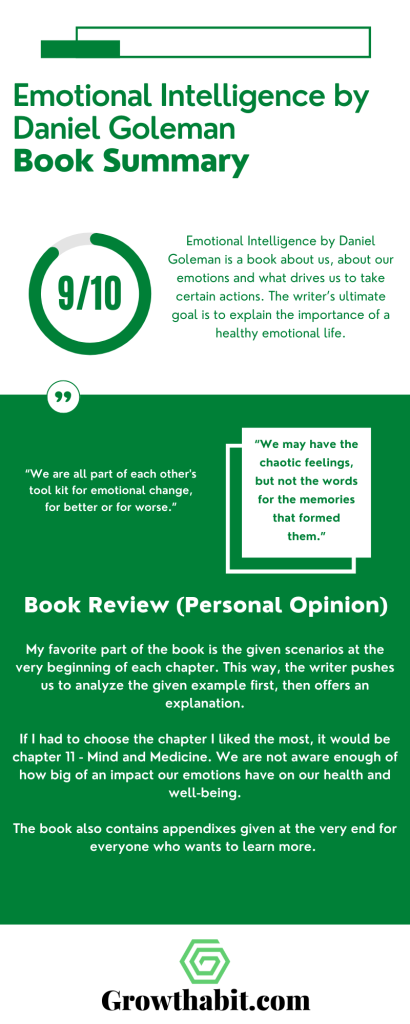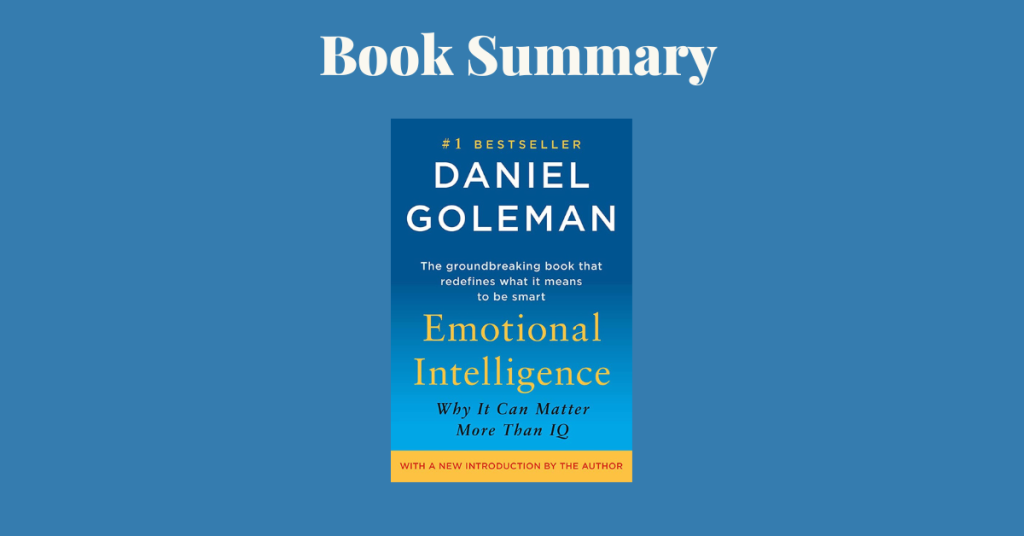Emotional Intelligence by Daniel Goleman is a book about us, about our emotions and what drives us to take certain actions. The writer’s ultimate goal is to explain the importance of a healthy emotional life.
Book Title: Emotional Intelligence, Why it can matter more than IQ
Author: Daniel Goleman
Date of Reading: March 2023
Rating: 9/10
What Is Being Said In Detail
This book goes through our entire emotional side and the whole science behind it which is, after scratching the surface, very complex.
Many examples are entwined giving us a much clearer look at the outcome of our emotions.
Besides talking about the causes of our emotions’ moves, a big portion of the book is focused on pillars of emotional intelligence such as:
- Emotional self-awareness
- Managing emotions
- Harnessing emotions productively
- Reading emotions – empathy
- Handling relationships
It focuses on psychological but also physical aspects of people’s intelligence. You can find a few pieces of research that have been described in order to figure something out from it.
Aristotle’s Challenge
This book starts with a pleasant scenery on a daily Madison Avenue bus ride but slowly jumps into the reality of happenings there and how everything has been going downhill by the everyday reports. Even though the situation has gotten worse, we have loads of improvement when it comes to scientific studies of emotion.
CHAPTER ONE – What Are Emotions For?
The first chapter gives us a few scenarios in which people had certain types of reactions. In each, there’s a debate about whether their reactions were led by emotions or not. It makes a parallel between the two minds each individual has, along with showing us the development of our brains throughout the centuries.
CHAPTER TWO – Anatomy of Emotional Hijacking
Chapter 2 begins with Richard Robles, who decided to do the last burglary in his career. After that, we are introduced to the amygdala, the core of the emotions’ behaviors. It explains the power of this region in our brain and how sometimes it can be triggered even without processing the surroundings. However, one part of our emotions can be controlled, and this chapter shows how.
CHAPTER THREE – When Smart Is Dumb
Chapter 3 starts by explaining how IQ does not automatically mean success and how emotional intelligence can influence success a lot. It talks about how much more effective life people who can control their emotions have. It mentioned Howard Gardner, a phycologist, and what he had discovered during his research on this topic. Further on, the writer briefly explains what to expect in the upcoming chapters. Lastly, it talks about two pure types – high IQ and emotionally intelligent people, taking into consideration that there are slight differences between men and women here.
CHAPTER FOUR – Know Thyself
Chapter 4 explains self-awareness and how it affects our behavior. Having it gives us much more freedom. By asking questions and bringing up different scenarios to the table, the writer goes deeper inside one’s brain decisions and fluctuation of emotions. Furthermore, it scratches the surface of alexithymia, the condition when one cannot acknowledge feelings or put them into words.
CHAPTER FIVE – Passion’s Slaves
After detecting emotions in our system, the next step would be finding a balance between over-feeling and under-feeling them. The fifth chapter speaks about this importance. A study that is presented shows how anger builds up inside of us and how it creates layers in our psyche. There is a portion reflecting on the condition of anxiety and ways of dealing with it.
CHAPTER SIX – The Master Aptitude
Impulses are a part of our system, and chapter 6 shows us their effect on our everyday lives. Optimism and pessimism are being compared, pointing out the outcome of each. The answer to incorporating emotional knowledge in the education system and how is given as well.
CHAPTER SEVEN – The Roots of Empathy
The logic behind empathy is unfolded in this chapter. Attunement and how it’s applicable to make the other side feel understood and sensed, and its disadvantages are elucidated. While reading, you can see how the brains of molesters and psychopaths work. Finally, there is a little touch of ethics combined with empathy.
CHAPTER EIGHT – The Social Arts
Chapter 8 focuses on one’s social abilities. It talks about showing emotion and understanding yours first. We transmit emotions from us to other people and vice versa, so the synchrony of both sides is important. Social skills, though, can go out of control, and the writer tells us in which direction it may lead. The cause of the social disability skills is presented as well. Lastly, the chapter speaks about emotional brilliance and how it’s achieved.
CHAPTER NINE – Intimate Enemies
Chapter 9 goes through statistics on marriages and divorces. Does emotional intelligence impact this relationship after we have pushed away social rules? Men and women have different perceptions when it comes to emotional life. Emotions affect mindsets, and adjusted ones keep the relationship going. No marriage is perfect, but you can find tips on how to behave in order to make your relationship last longer.
CHAPTER TEN – Managing with Heart
This chapter is about managing our hearts and thoughts. Critiquing can be tricky if you cannot distinguish the one that motivates from the one that might lead to a total disaster. The art of constructive criticism entwines here. By giving an example of prejudice against black people, the writer shows how living diversity should look alike. How can a group be successful thanks to its structure and harmony?
CHAPTER ELEVEN – Mind and Medicine
Chapter 11 emphasizes the connection between our immune and nervous system, and how our emotions affect our body and health. The importance of the state of mind is interpreted, pointing out that it can lead, if out of control and along with some other factors, to a medical disease. When emotions become our enemy, depression is born. Although not all emotions can do us wrong, positive feelings can give a boost to our body.
CHAPTER TWELVE – The Family Crucible
Chapter 12 is not excluded from bringing up the awareness of emotional intelligence. This time, the writer reflects on our parents’ behavior and their ways of raising us. You can find out which seven ingredients are crucial in making a child emotionally stable.
CHAPTER THIRTEEN – Trauma and Emotional Relearning
Chapter 13 glances at PTSD, a shortcut for post-traumatic stress disorder. Unfortunate events that happen during our lives, can permanently change the structure of our brains. The steps we can take to relieve the mentioned disorder are listed throughout the chapter. A way of doing this may be art since people who choose this option are better at illustrating their thoughts rather than speaking about them. It is important to associate the unfortunate memory with safety.
CHAPTER FOURTEEN – Temperament Is Not Destiny
There are different kinds of people and some of their motions are given in their roots. This chapter categorizes them and tries to figure out whether they can be changed or not. Jerome Kagan, a psychologist, says we can still adjust our temperaments, especially during our childhood days because that is the time most of our brain gets developed.
CHAPTER FIFTEEN – The Cost of Emotional Illiteracy
Even though as a nation, we have come so far, this chapter shows that while moving on, we neglected our emotional literacy. One of the studies shows that, with their parent’s absence, children have become bad at a variety of things. With not being able to face our emotions, people reach out to short-term relievers such as alcohol and drugs. The remaining question is if it helps, and as Goleman explains, it does not.
CHAPTER SIXTEEN – Schooling the Emotions
The book ends with chapter 16 explaining to us why the subject of emotional intelligence should be taught at schools. Even though it may take years until we master this skill, schooling is very beneficial on our way to mastery. The competencies a child can gain if emotional intelligence were brought up in schools are numerous, like managing emotions, empathy, and self-awareness. This life skill brings many benefits and as the writer says, it is needed now more than ever.
Most Important Keywords, Sentences, Quotes
Aristotle’s Challenge
„But the news simply reflects back to us on a larger scale a creeping sense of emotions out of control in our own lives and in those of the people around us. No one is insulated from this erratic tide of outburst and regret; it reaches into all of our lives in one way or another.“
„This book is a guide to making sense of the senselessness.”
„These are times when the fabric of society seems to unravel at ever-greater speed, when selfishness, violence, and a meanness of spirit seem to be rotting the goodness of our communal lives.“
„The ability to control impulse is the base of will and character.“
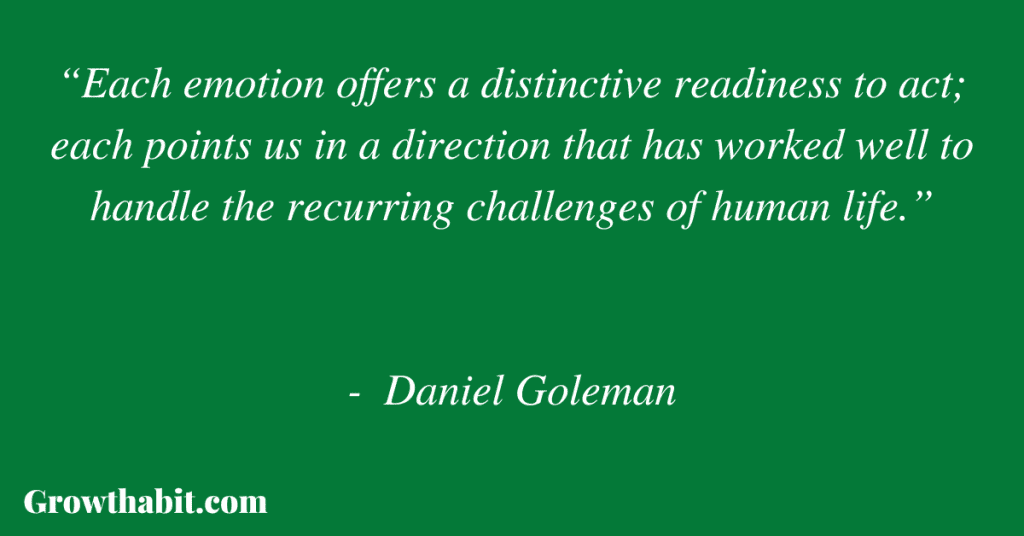
„In this book I serve as a guide in a journey through these scientific insights into the emotions, a voyage aimed at bringing greater understanding to some of the most perplexing moments in our own lives and in the world around us. The journey’s end is to understand what it means—and how—to bring intelligence to emotion.“ „Our genetic heritage endows each of us with a series of emotional set-points that determines our temperament.“
CHAPTER ONE – What Are Emotions For?
„But from the perspective of a parent making a desperate decision in a moment of crisis, it is about nothing other than love.“
„Each emotion offers a distinctive readiness to act; each points us in a direction that has worked well to handle the recurring challenges of human life.“
„All emotions are, in essence, impulses to act, the instant plans for handling life that evolution has instilled in us.“
„It was a time when few infants survived to childhood and few adults to thirty years, when predators could strike at any moment, when the vagaries of droughts and floods meant the difference between starvation and survival.“
„There is a steady gradient in the ratio of rational-to-emotional control over the mind; the more intense the feeling, the more dominant the emotional mind becomes—and the more ineffectual the rational.“
„But when passions surge the balance tips: it is the emotional mind that captures the upper hand, swamping the rational mind.“
„The more complex the social system, the more essential is such flexibility—and there is no more complex social world than our own.“
CHAPTER TWO – Anatomy of an Emotional Hijacking
„Without an amygdala he seemed to have lost all recognition of feeling, as well as any feeling about feelings. The amygdala acts as a storehouse of emotional memory, and thus of significance itself; life without the amygdala is a life stripped of personal meanings.“
„Without an amygdala, there are no tears of sorrow to soothe.“
„Most intriguing for understanding the power of emotions in mental life are those moments of impassioned action that we later regret, once the dust has settled; the question is how we so easily become so irrational.“
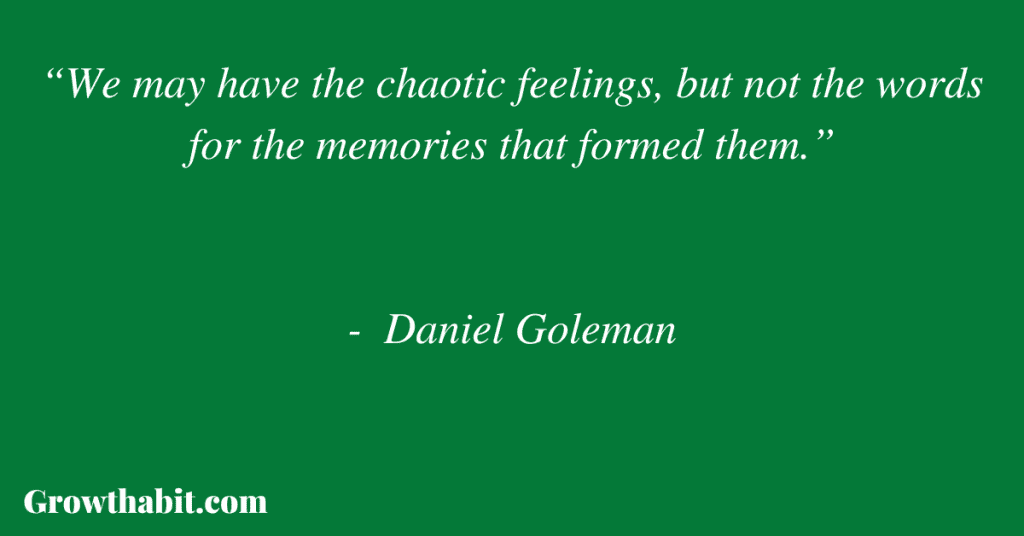
„We may have the chaotic feelings, but not the words for the memories that formed them.“
„Likewise, the thinking brain plays an executive role in our emotions—except in those moments when emotions surge out of control and the emotional brain runs rampant.“
„The new paradigm urges us to harmonize head and heart. To do that well in our lives means we must first understand more exactly what it means to use emotion intelligently.“
CHAPTER THREE – When Smart Is Dumb
„Academic intelligence has little to do with emotional life. The brightest among us can founder on the shoals of unbridled passions and unruly impulses; people with high IQs can be stunningly poor pilots of their private lives.”
“And that is the problem: academic intelligence offers virtually no preparation for the turmoil—or opportunity—life’s vicissitudes bring.”
“And when asked to put each boy and girl with the children they like to play with most, Judy shows she can match best friends for the entire class.”
“By encouraging children to develop a full range of the abilities that they will actually draw on to succeed, or use simply to be fulfilled in what they do, school becomes an education in life skills.”
“Our humanity is most evident in our feelings;”
“And in the day-to-day world no intelligence is more important than the interpersonal. If you don’t have it, you’ll make poor choices about who to marry, what job to take, and so on”
“…the ability to monitor feelings from moment to moment is crucial to psychological insight and self-understanding. An inability to notice our true feelings leaves us at their mercy.”
“To the degree a person has both cognitive and emotional intelligence, these pictures merge. Still, of the two, emotional intelligence adds far more of the qualities that make us more fully human.”
CHAPTER FOUR – Know Thyself
“Self-awareness is not an attention that gets carried away by emotions, overreacting and amplifying what is perceived. Rather, it is a neutral mode that maintains self-reflectiveness even amidst turbulent emotions.”
“In terms of the neural mechanics of awareness, this subtle shift in mental activity presumably signals that neocortical circuits are actively monitoring the emotion, a first step in gaining some control.”
“Aware of their moods as they are having them, these people understandably have some sophistication about their emotional lives.”
“Diener finds that women, in general, feel both positive and negative emotions more strongly than do men. And, sex differences aside, emotional life is richer for those who notice more.”
“…as he confided to his therapist, he was unable to speak openly about his feelings with anyone in his life. The reason: He did not know what he felt in the first place.”
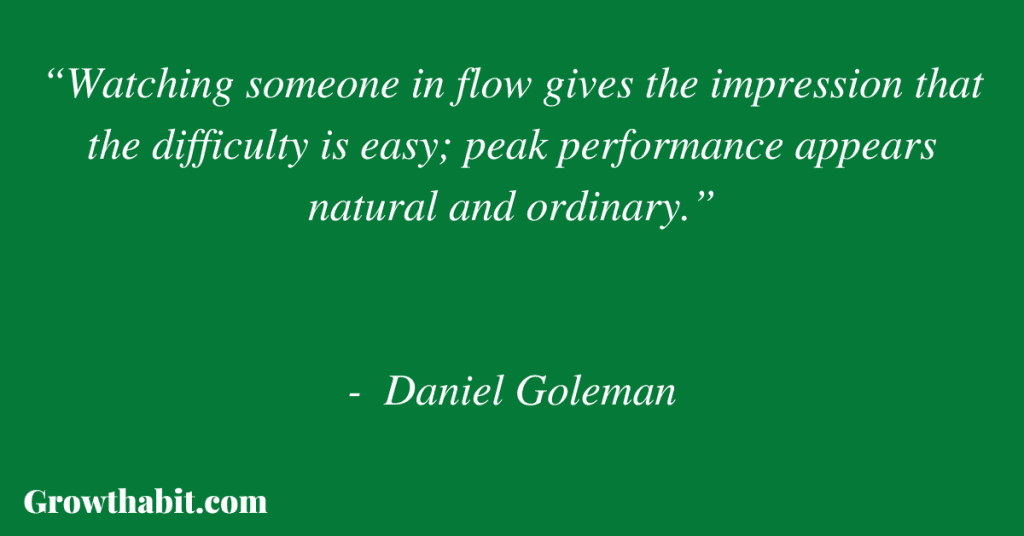
“Elliot’s thinking had become computerlike, able to make every step in the calculus of a decision, but unable to assign values to differing possibilities.”
“As Freud made clear, much of emotional life is unconscious; feelings that stir within us do not always cross the threshold into awareness.”
CHAPTER FIVE – Passion’s Slaves
“It is not that people need to avoid unpleasant feelings to feel content, but rather that stormy feelings not go unchecked, displacing all pleasant moods.”
“Indeed, anger is the most seductive of the negative emotions; the selfrighteous inner monologue that propels it along fills the mind with the most convincing arguments for venting rage.”
“Distraction, Zillmann finds, is a highly powerful mood-altering device, for a simple reason: It’s hard to stay angry when we’re having a pleasant time. The trick, of course, is to get anger to cool to the point where someone can have a pleasant time in the first place.”
“Worry is, in a sense, a rehearsal of what might go wrong and how to deal with it; the task of worrying is to come up with positive solutions for life’s perils by anticipating dangers before they arise.”
“Tice told me, “Praying, if you’re very religious, works for all moods, especially depression.”
“In short, unflappableness is a kind of upbeat denial, a positive dissociation—and, possibly, a clue to neural mechanisms at play in the more severe dissociative states that can occur in, say, post-traumatic stress disorder. “
CHAPTER SIX – The Master Aptitude
„I had been in that lecture hall for many classes. This morning, though, I noticed nothing through the windows and did not see the hall at all. My gaze shrank to the patch of floor directly in front of me as I made my way to a seat near the door. As I opened the blue cover of my exam book, there was the thump in my ears of heartbeat, there was the taste of anxiety in the pit of my stomach.“
„Starting earlier offers a lifetime edge: the top violin students at the best music academy in Berlin, all in their early twenties, had put in ten thousand total hours’ lifetime practice, while the second-tier students averaged around seventy-five hundred hours.“
„People who are optimistic see a failure as due to something that can be changed so that they can succeed next time around, while pessimists take the blame for failure, ascribing it to some lasting characteristic they are helpless to change.“
“While the pessimist’s mental set leads to despair, the optimist’s spawns hope.“
„”People seem to concentrate best when the demands on them are a bit greater than usual, and they are able to give more than usual. If there is too little demand on them, people are bored. If there is too much for them to handle, they get anxious. Flow occurs in that delicate zone between boredom and anxiety.”
„Watching someone in flow gives the impression that the difficulty is easy; peak performance appears natural and ordinary.“
CHAPTER SEVEN – The Roots of Empathy
„Empathy builds on self-awareness; the more open we are to our own emotions, the more skilled we will be in reading feelings.“
„When a parent consistently fails to show any empathy with a particular range of emotion in the child—joys, tears, needing to cuddle—the child begins to avoid expressing, and perhaps even feeling, those same emotions. “
„: Should you lie to keep from hurting a friend’s feelings? Should you keep a promise to visit a sick friend or accept a last-minute invitation to a dinner party instead? When should a life-support system be kept going for someone who would otherwise die?“
„The heart of the psychopath’s coldness seems to lie in an inability to make anything more than the shallowest of emotional connections. The cruelest of criminals, such as sadistic serial killers who delight in the suffering of their victims before they die, are the epitome of psychopathy. “
CHAPTER EIGHT – The Social Arts
“An education in display rules is imparted when we instruct a child not to seem disappointed, but to smile and say thank you instead, when Grandpa has given a dreadful but well-meant birthday present.”
“We are all part of each other’s tool kit for emotional change, for better or for worse.”
“Emotional entrainment is the heart of influence.”
“It was only Roger who noticed Reggie’s plight and pain, and only Roger who tried to provide some solace, even if all he could offer was rubbing his own knee”
“His nervousness during encounters led him to snicker and laugh at the most awkward moments, even though he failed to laugh when someone said something genuinely funny.”
“The two cardinal sins that almost always lead to rejection are trying to take the lead too soon and being out of synch with the frame of reference.”
“Roger’s tactic for entering a group was first to observe, then to imitate what another child was doing, and finally to talk to the child and fully join the activity—a winning strategy”
“If the test of social skill is the ability to calm distressing emotions in others, then handling someone at the peak of rage is perhaps the ultimate measure of mastery.”
“Whoever has the mind to fight has broken his connection with the universe. If you try to dominate people you are already defeated. We study how to resolve conflict, not how to start it.”
CHAPTER NINE – Intimate Enemies
“It can be argued that much of this rise is due not so much to a decline in emotional intelligence as to the steady erosion of social pressures—the stigma surrounding divorce, or the economic dependence of wives on their husbands—that used to keep couples together in even the most miserable of matches.”
“But if social pressures are no longer the glue that holds a marriage together, then the emotional forces between wife and husband are that much more crucial if their union is to survive.”
“…women come into a marriage groomed for the role of emotional manager, while men arrive with much less appreciation of the importance of this task for helping a relationship survive.”
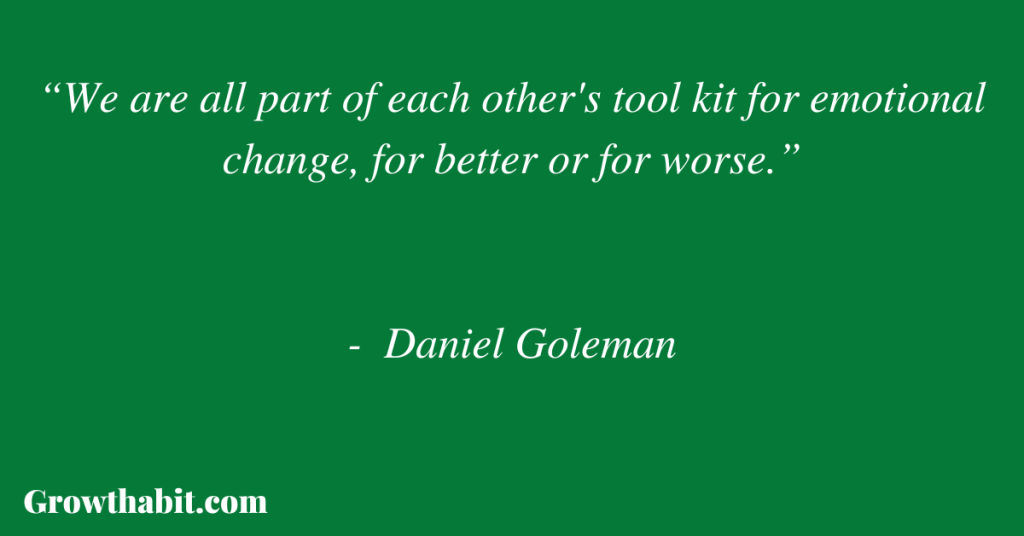
“As the wife sees her husband withdraw from engagement, she ups the volume and intensity of her complaint, starting to criticize him. As he becomes defensive or stonewalls in return, she feels frustrated and angry, and so adds contempt to underscore the strength of her frustration.”
“Couples will be able to make the key changes in direct proportion to how motivated they are to try.”
“Listening is a skill that keeps couples together. Even in the heat of an argument, when both are seized by emotional hijackings, one or the other, and sometimes both, can manage to listen past the anger, and hear and respond to a partner’s reparative gesture.”
CHAPTER TEN – Managing with Heart
“The cockpit is a microcosm of any working organization. But lacking the dramatic reality check of an airplane crash, the destructive effects of miserable morale, intimidated workers, or arrogant bosses—or any of the dozens of other permutations of emotional deficiencies in the workplace— can go largely unnoticed by those outside the immediate scene.”
“Leadership is not domination, but the art of persuading people to work toward a common goal.”
“Dispirited and depressed, he was convinced he would never get another assignment of importance at the company, and was thinking of leaving, even though he enjoyed his work there.”
“Many managers are too willing to criticize, but frugal with praise, leaving their employees feeling that they only hear about how they’re doing when they make a mistake.”
“The critique may open the door to possibilities and alternatives that the person did not realize were there, or simply sensitize her to deficiencies that need attention—but should include suggestions about how to take care of these problems.”
“People who are uncomfortable giving criticism—or offering praise—are likely to ease the burden on themselves by doing it at a distance, such as in a memo.”
“The psychological price of loyalty to one’s own group can be antipathy toward another, especially when there is a long history of enmity between the groups.”
CHAPTER ELEVEN – Mind and Medicine
“I have a foggy memory of his explaining to me when and where to go for diagnostic tests. It was the simplest instruction, but I had to ask him to repeat it three or four times. Cytology —my mind would not leave the word. That one word made me feel as though I had just been mugged at my own front door.”
“Anxiety—the distress evoked by life’s pressures—is perhaps the emotion with the greatest weight of scientific evidence connecting it to the onset of sickness and course of recovery”
“When anxiety helps us prepare to deal with some danger (a presumed utility in evolution), then it has served us well. But in modern life anxiety is more often out of proportion and out of place —distress comes in the face of situations that we must live with or that are conjured by the mind, not real dangers we need to confront.”
“Add the sounds of silence to the list of emotional risks to health—and close emotional ties to the list of protective factors”
“My inability to ask the single question I cared about most is repeated a thousand times each day in hospitals and clinics everywhere.”
CHAPTER TWELVE – The Family Crucible
“Ann, the mother, urges, her voice growing more intent and anxious as Leslie, sucking on her lip and staring wide-eyed at the video screen, struggles to follow these directives…..Leslie, unable to please either her father or her mother, contorts her jaw in tension and blinks as her eyes fill with tears.”
“There are hundreds of studies showing that how parents treat their children—whether with harsh discipline or empathic understanding, with indifference or warmth, and so on—has deep and lasting consequences for the child’s emotional life.”
“The ways a couple handles the feelings between them—in addition to their direct dealings with a child—impart powerful lessons to their children, who are astute learners, attuned to the subtlest emotional exchanges in the family.”
“It is not that these babies fail to bring the blocks together; they understand the instruction and have the coordination to comply. But even when they do, reports Brazelton, their demeanor is “hangdog,” a look that says, “I’m no good. See, I’ve failed.””
“The first three or four years of life are a period when the toddler’s brain grows to about two thirds its full size, and evolves in complexity at a greater rate than it ever will again.”
CHAPTER THIRTEEN – Trauma and Emotional Hijacking
“Many children became hypervigilant, as though continually on guard against a repetition of the terror; some boys and girls would hover at recess next to the classroom doors, not daring to venture out to the playground where the killings had occurred. Others would only play in small groups, posting a designated child as a lookout.”
“If people feel there is something they can do in a catastrophic situation, some control they can exert, no matter how minor, they fare far better emotionally than do those who feel utterly helpless. The element of helplessness is what makes a given event subjectively overwhelming.”
“Ordinarily, when someone learns to be frightened by something through fear conditioning, the fear subsides with time.”
“The original fear ingrained in the amygdala does not go away completely; rather, the prefrontal cortex actively suppresses the amygdala’s command to the rest of the brain to respond with fear.”
“By the time she came for therapy Irene had symptoms of PTSD, had given up socializing at all, and felt a prisoner in her own house.”
“The more ordinary travails of childhood, such as being chronically ignored and deprived of attention or tenderness by one’s parents, abandonment or loss, or social rejection may never reach the fever pitch of trauma, but they surely leave their imprint on the emotional brain, creating distortions—and tears and rages—in intimate relationships later in life.“
CHAPTER FOURTEEN – Temperament Is Not Destiny
“The timid children seem to come into life with a neural circuitry that makes them more reactive to even mild stress—from birth, their hearts beat faster than other infants’ in response to strange or novel situations.”
“In one study of 754 boys and girls in those grades, 44 were found to have already suffered at least one episode of panic, or to have had several preliminary symptoms.”
“During a critical period between ten and eighteen months, the orbitofrontal area of the prefrontal cortex is rapidly forming the connections with the limbic brain that will make it a key on/off switch for distress. The infant who through countless episodes of being soothed is helped along in learning how to calm down, the speculation goes, will have stronger connections in this circuit for controlling distress, and so throughout life will be better at soothing himself when upset.”
“The massive sculpting and pruning of neural circuits in childhood may be an underlying reason why early emotional hardships and trauma have such enduring and pervasive effects in adulthood.”
CHAPTER FIFTEEN – The Cost of Emotional Illiteracy
“The most common cause of disability among teenagers is mental illness. Symptoms of depression, whether major or minor, affect up to one third of teenagers; for girls, the incidence of depression doubles at puberty”
“No children, rich or poor, are exempt from risk; these problems are universal, occurring in all ethnic, racial, and income groups.”
“He was the kid who would steal your lunch money, take your bike, slug you as soon as talk to you. Jimmy was the classic bully, starting fights with the least provocation, or none at all”
“There is, of course, no single pathway to violence and criminality, and many other factors can put a child at risk: being born in a high-crime neighborhood where they are exposed to more temptations to crime and violence, coming from a family under high levels of stress, or living in poverty”
“Those who see a bad grade as due to some personal flaw (“I’m stupid”) feel more depressed than those who explain it away in terms of something they could change (“If I work harder on my math homework I’ll get a better grade”)”
“Ben then stalks off to his empty table, crying quietly. Jason and Chad go over to him and try to talk to him, but Ben puts his fingers in his ears, determinedly ignoring them, and runs out of the lunchroom to hide behind the school Dumpster”
CHAPTER SIXTEEN – Schooling the Emotions
“The classes themselves may at first glance seem uneventful, much less a solution to the dramatic problems they address. But that is largely because, like good child rearing at home, the lessons imparted are small but telling, delivered regularly and over a sustained period of years.”
“Mastery in the emotional domain is especially difficult because skills need to be acquired when people are usually least able to take in new information and learn new habits of response—when they are upset.”
“The timetable for emotional growth is intertwined with allied lines of development, particularly for cognition, on the one hand, and brain and biological maturation, on the other”
“Seeing things from another’s perspective breaks down biased stereotypes, and so breeds tolerance and acceptance of differences.”
“But given the crises we find ourselves and our children facing, and given the quantum of hope held out by courses in emotional literacy, we must ask ourselves: Shouldn’t we be teaching these most essential skills for life to every child—now more than ever?”
Book Review (Personal Opinion):.
My favorite part of the book is the given scenarios at the very beginning of each chapter. This way, the writer pushes us to analyze the given example first, then offers an explanation.
If I had to choose the chapter I liked the most, it would be chapter 11 – Mind and Medicine. We are not aware enough of how big of an impact our emotions have on our health and well-being.
The book also contains appendixes given at the very end for everyone who wants to learn more.
Rating: 9/10
This Book Is For:
- People fighting depression
- Psychologists
- People striving for excellence
If You Want To Learn More
Check out what Daniel Goleman has to say about a superpower that everyone can have:
Emotional Intelligence is a Superpower
How I’ve Implemented The Ideas From The Book
Each part of this book teaches us something new, from the very beginning where we talk about the anatomy of emotions to the last chapter, where we conclude why education on this topic is important.
I have learned how to think about my emotions properly. It is not always easy to comprehend what is going on inside our heads, but as long as we try, we will have a good outcome.
The book widens our views when it comes to relationships, and I have picked up some tips to implement in my surroundings.
One Small Actionable Step You Can Do
By reading this book, some questions will pop up in our heads, and we will be motivated to search further into this subject.
Chapter 5 catches attention with its purpose. Nowadays, anxiety and depression are escalating more than ever before. Thanks to this part of the book, we can see that hope isn’t lost. We can adjust and ease this condition by the steps presented.
